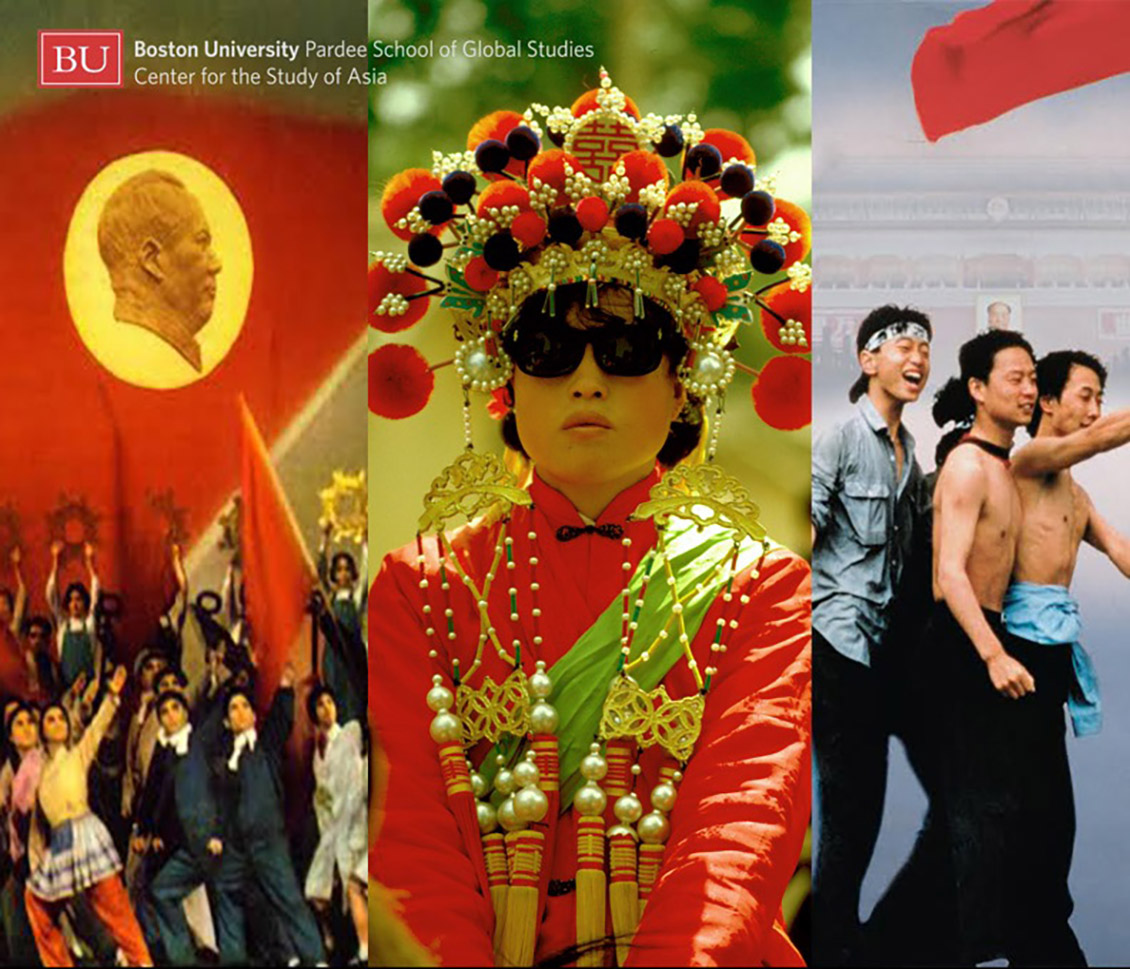History in Images, History in Words: In Search of Facts in Documentary Filmmaking
History in Images, History in Words:
In Search of Facts
in Documentary Filmmaking
A lecture by Carma Hinton
Robinson Professor of Visual Culture and Chinese Studies at George Mason University
Monday April 10, 2017 from 4-7 pm
at the Photonics Center (9th fl.), 8 St. Mary’s Street, Boston University
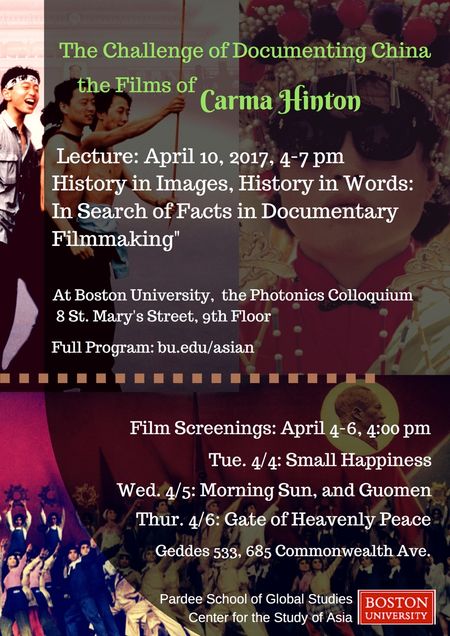 My presentation will focus on the process of documentary filmmaking, especially the many challenges my team and I faced in trying to create engaging filmic narratives that are both factually accurate and encompass multiple perspectives. I will use excerpts from my films as well as out-takes to illustrate the difficulties in determining what information to include and exclude, assess the compromises involved in the choices, and explore the consequences of taking various possible paths. I will also address the different problems that a historian encounters when presenting history in images as opposed to in words: the potential and limitation of each medium and what information each might privilege or obscure. I believe that in this age of “alternative facts” and “parallel universes,” reflections on the challenges in obtaining authenticity and truth and the importance of relentlessly striving to reach this goal, take on particularly urgent meaning.
My presentation will focus on the process of documentary filmmaking, especially the many challenges my team and I faced in trying to create engaging filmic narratives that are both factually accurate and encompass multiple perspectives. I will use excerpts from my films as well as out-takes to illustrate the difficulties in determining what information to include and exclude, assess the compromises involved in the choices, and explore the consequences of taking various possible paths. I will also address the different problems that a historian encounters when presenting history in images as opposed to in words: the potential and limitation of each medium and what information each might privilege or obscure. I believe that in this age of “alternative facts” and “parallel universes,” reflections on the challenges in obtaining authenticity and truth and the importance of relentlessly striving to reach this goal, take on particularly urgent meaning.
About the speaker:
Carma Hinton is an art historian and a filmmaker. She received her Ph.D. in Art History from Harvard University and is now Robinson Professor of Visual Culture and Chinese Studies at George Mason University. Together with Richard Gordon, Hinton has directed many documentary films, including Small Happiness, All Under Heaven, To Taste a Hundred Herbs, Abode of Illusion: The Life and Art of Chang Dai-chien, The Gate of Heavenly Peace, and Morning Sun. She has won two Peabody Awards, the American Historical Association’s John E. O’Connor Film Award, the International Critics Prize and the Best Social and Political Documentary at the Banff Television Festival, and a National News & Documentary Emmy, among others. Hinton is currently working on a book about Chinese scrolls depicting the theme of demon quelling. Carma Hinton was born in Beijing. Chinese is her first language and culture.

Zeying Wu (Ph.D. student, BU Political Science) publishes new article ” Youth Nationalism in Japan During the Lost Decades”
 We are pleased to bring to your attention a recent article published by Ms. Zeying Wu, a Ph.D. student in Political Science at Boston University. The article, "Youth Nationalism in Japan During the Lost Decades," can be freely accessed at https://asian.fiu.edu/projects-and-grants/japan-studies-review/journal-archive/volume-xxii-2018/wu-zeying-youth-nationalism-in-japan-during-the-lost-decades.pdf
We are pleased to bring to your attention a recent article published by Ms. Zeying Wu, a Ph.D. student in Political Science at Boston University. The article, "Youth Nationalism in Japan During the Lost Decades," can be freely accessed at https://asian.fiu.edu/projects-and-grants/japan-studies-review/journal-archive/volume-xxii-2018/wu-zeying-youth-nationalism-in-japan-during-the-lost-decades.pdf
The Overview published in the article states:
With the bursting of the “bubble economy” in the early 1990s, Japan has been experiencing deflation for more than two decades–known as Japan’s “Lost Decades.” What has been the impact of this prolonged economic stagnation on Japan’s youth? In particular, how has it influenced and shaped their national identity and, accordingly, their nationalism? Looking from a constructivist approach and guided by the experiential theory of social generation, this study examines how Japanese in their 20s have come to mediate and respond to economic stagnation and reconstruct national identities different from those of Japanese youth in the 1970s and 1980s.
It suggests that without inheriting the previously established national identity and homogeneous economic nationalism of the prior generation, yet with their constant aspiration to ensure Japan’s global competitiveness, current Japanese youth have tried to identify Japan with various other social institutions rather than simply with economic development. They have, therefore, exhibited a high level of heterogeneity in their nationalism, signifying a similar transition from homogeneity to heterogeneity in many other sectors of Japanese society during the Lost Decades.
Taiwan Forum: Taiwan’s Democracy, China’s Cross-Strait Policy, and US Interests, Dec. 4
The Boston University Center for the Study of Asia is pleased to present its next
Taiwan Forum
on Tuesday, Dec. 4, 2018 from 4:15-5:45 pm
Taiwan’s Democracy,
China’s Cross-Strait Policy,
and United States Interests
presented by
Richard C. Bush 卜睿哲
Senior Fellow, Center for East Asia Policy Studies,
Chen-Fu and Cecilia Yen Koo Chair in Taiwan Studies,
The Brookings Institution
This presentation and discussion, with a reception to follow, will take place at the
Frederick S. Pardee School of Global Studies, 121 Bay State Road, Boston University, Boston, MA 02215

The Taiwan Forum, along with many other Taiwan-related programs and resources at Boston University, is supported by the Taiwan Ministry of Education and the Taipei Economic and Cultural Office in Boston.
Between Freedom and Death: Female Taxi Drivers as Cross-Gender Labor in Authoritarian South Korea (Dec. 7)
The BU Women, Gender, & Sexuality Program, and
the Center for the Study of Asia, are pleased to present
Todd Henry
(Associate Professor, Department of History, UC-San Diego)
Between Freedom and Death:
Female Taxi Drivers as Cross-Gender Labor in Authoritarian South Korea
Friday, December 7, 2018, 4:30 pm-6:00 pm
121 Bay State Road, Boston University
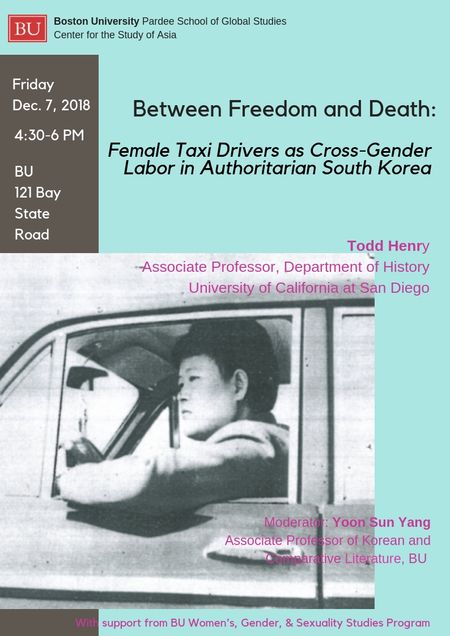
Abstract:
This paper analyzes media representations of cross-gender labor with a focus on female taxi drivers. Through the everyday lives of these women, I examine what such non-normative working practices reveal about the gendered and sexualized dynamics of South Korea’s authoritarian development, a topic yet to receive adequate attention. I propose that city streets functioned as an empowering but dangerous stage where female taxi drivers explored new forms of wage labor and human intimacies. Because these practices challenged hetero-patriarchal and bourgeois prescriptions of reproduction and housewifery, state-censored publications decried them as “eccentric,” while media entrepreneurs sought to profit from their sensationalization. In highlighting urban space as an eroticized contact zone, the paper brings into a dialogue two fields that rarely speak to one another: Korean Studies and Queer Studies. In terms of the former, female taxi drivers demonstrate that gender variance and non-normative sexuality were generative products of rapid industrialization. I argue that this occupation offered working-class women a limited degree of freedom from hetero-patriarchal pressures. Even as their journeys into public space empowered them, repeated exposure – accentuated by alarming reports alleging infringement on male privilege – subjected them to violent assault and even death. Finally, I connect the necropolitical underside of female taxi driving to the everyday struggles of queer and migrant people of color, whose precarious lives ethnic studies scholars have deployed as a critique of liberal humanism and multi-cultural assimilation. Through these comparative insights, I emphasize the informal bonds that Korean cabwomen formed in response to popular scrutiny and misogynistic harassment. I suggest how their gynocentric associations aimed to protect themselves from a male-dominated state and society upon which they could not rely for sustenance nor survival.
Todd Henry
Associate Professor, Department of History, University of California at San Diego
Todd Henry (Ph.D., UCLA, 2006; Associate Professor) is a specialist of modern Korea with a focus on the period of Japanese rule (1905-1945) and its postcolonial afterlives. A social and cultural historian interested in global forces that (re)produce lived spaces, he examines cross-border processes that link South Korea, North Korea, Japan, and the US in the creation of “Hot War” militarisms, the transpacific practice of medical science, and the embodied experiences of hetero-patriarchal capitalism. Dr. Henry’s first book, Assimilating Seoul (UC Press, 2014), addressed the violent but contested role of public spaces in colonial Korea. He has also written several related articles on questions of place, race, and nation in colonizing and decolonizing movements on the peninsula. Currently, Dr. Henry is completing his second book, entitled The Profit of Queerness. This study of authoritarian development in Cold War South Korea (1948-1993) examines the ideological functions and subcultural dynamics of queerness as they relate to middlebrow journalism and sexual science, anti-communist modes of kinship and citizenship, and globalized discourses and practices of the “sexual revolution.” A sample of this new work appears in his edited volume, Queer Korea (Duke UP, 2019). A third book will explore how the pre-WWII history of imperialism and militarism in the Asia-Pacific region informed articulations of virile masculinity and practices of gay sex tourism in postwar Japan and across its former empire. Dr. Henry has received two Fulbright grants (Kyoto University, 2004-2005; Hanyang and Ewha Womans Universities, 2013), two fellowships from the Korea Foundation (Seoul National University, 2003-2004; Harvard University, 2008-2009), and one fellowship from the Kyujanggak Institute for Korean Studies (Seoul National University, 2019). At UCSD, he is an affiliate faculty member of Critical Gender Studies and Science Studies. From 2013 until 2018, Dr. Henry served as the inaugural director of Transnational Korean Studies, the recipient of a $600,000 grant from the Academy of Korean Studies as a Core University Program for Korean Studies.
Taiwan Chamber of Commerce New England sponsors “Pitch Day” competition for Entrepreneurs, Nov 11
The Taiwan Chamber of Commerce of New England (TCCNE) and Taiwan Youth Chamber of Commerce of New England (TYCCNE) are hosting a
Networking/Pitch Competition
event for entrepreneurs, private investors, corporate finance professionals, and whoever is interested in the startup ecosystem. There will be two keynote speeches followed by a pitch competition in the afternoon. Join this event to see some of the most interesting companies of tomorrow before anyone else and network with the key players.
Sunday, November 11, 2018 from 12:30-5 pm
at Boston University, Life Science and Engineering Building (LSE-B01),
24 Cummington Mall, Boston MA 02215

A Pitch Day is a competitive platform to give voice and visibility to under-represented entrepreneurs in a setting where they can pitch their brightest ideas and receive feedback and funding to take their business concept to the next level.
Participants will span a number of areas of expertise, including: Information Technology, Life Sciences, Advanced Manufacturing, Electronic Science & Technology, Healthcare & Biotechnology, and Renewable Energy. A group of ten startups will be pre-selected by TCCNE in conjunction with a panel of tech experts from MIT and Harvard.
Registration 12:30 pm - 1:00 pm
Welcoming Remarks 1:00 pm - 1:10 pm
Keynote Address 1 1:10 pm - 1:40 pm
Keynote Address 2 1:50 pm - 2:20 pm
Break 2:20 pm - 2:50 pm
Competition 2:50 pm - 4:50 pm
Closing 4:50 pm - 5:00 pm
Where is Pakistan Headed? Weds. Oct. 24!
Join the conversation!
Where is Pakistan Headed?
A Conversation with Senator Javed Jabbar
Former senator, Former Minister for Information & Media Development,
and Advisor on National Affairs (Pakistan)
Wednesday, Oct. 24, 2018 12pm-1:15pm.
121 Bay State Road
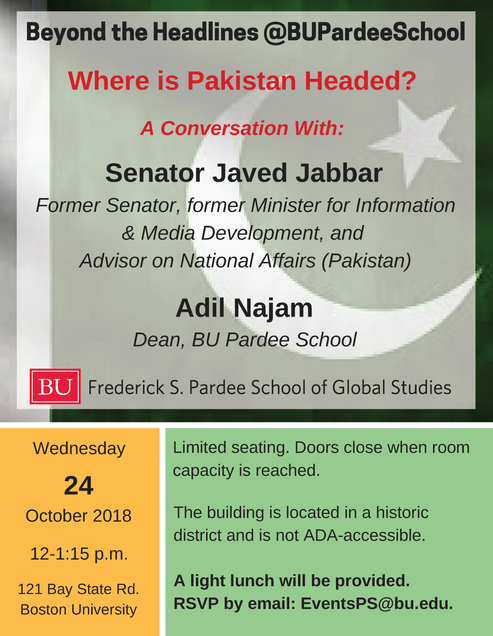
Obert Hodzi’s new book, The End of China’s Non-Intervention Policy in Africa, Oct. 24
Join us for a major book launch event!
Celebrate the release of Dr. Obert Hodzi's new book,
The End of China's Non-Intervention Policy in Africa
Wednesday, Oct. 24, 2018 12:15-2 pm.
African Studies Center, 232 Bay State Road, Room 505.

Global China Research Colloquium: Going Beyond Aid, Oct. 24, 2018
Join the Global Development Policy Center's for the first event
in their Global China research series:
Going beyond Aid: Development
Cooperation for Structural
Transformation
WITH DR. YAN WANG
Peking & George Washington University
Wednesday, October 24, 2018
Global Development Policy Center, 53 Bay State Road
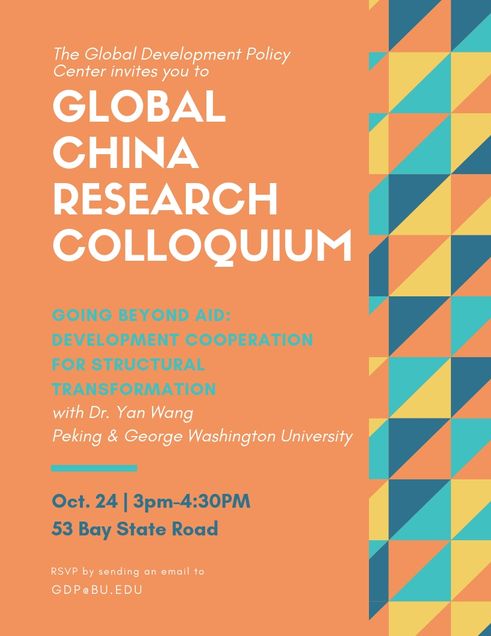
RSVP at gdp@bu.edu
Visit http://www.bu.edu/gdp/ to learn more.
Origins of the Silk Roads, Weds. Oct. 24
Mark your calendar for a free public lecture!
Origins of the Silk Road:
Lecture given by Rowan Flad
Wednesday, October 24, 2018 at 6:00 pm
Geological Lecture Hall, 24 Oxford Street, Cambridge, MA 02138
at the Peabody Museum of Archaeology and Ethnology at Harvard University
https://www.peabody.harvard.edu/origins-of-silk-roads

Rowan Flad, John E. Hudson Professor of Archaeology, Department of Anthropology, Harvard University
Approximately 4,000 years ago, the peoples of China and Eurasia gradually began to develop networks of interaction and exchange that radically transformed the cultures of both regions. These networks eventually gave rise to the Silk Road trade routes connecting the East and West. Rowan Flad will examine the archaeological evidence—from the Qijia Culture of Northwest China—that documents the agricultural, metallurgical, and technological innovations that resulted from the earliest trans-Eurasian exchanges, and how studies of the Silk Road origins are being reinvigorated by China’s One Belt, One Road initiative.
Lecture. Free and open to the public. Presented by Peabody Museum of Archaeology & Ethnology.
Free event parking available at 52 Oxford Street Garage
This event will be livestreamed on the Harvard Museums of Science & Culture Facebook page. A recording of this program will be available on our YouTube channel approximately three weeks after the lecture.
On the Edge: Cultural Appropriation or Cultural Sharing? Thurs. Oct 25!
Come learn and discuss at our latest symposium!
On the Edge: Cultural Appropriation or Cultural Sharing?
Reception to follow!
Thursday, October 25, 2018 from 2:15pm to 5:15pm
53 Bay State Road
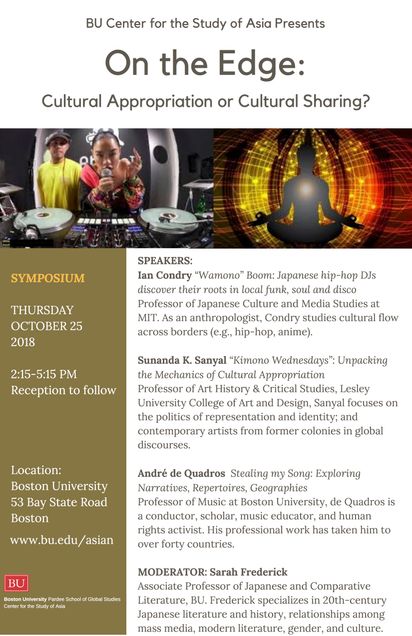
The Department of Anthropology Lunch Seminar: “The Place of Wonder” by Tulasi Srinivas, Nov. 1
The Boston University Department of Anthropology
presents the next lecture in its Fall 2018 Lunch Seminar Series
“The Place of Wonder”
Lecture presented by Tulasi Srinivas
In this talk Tulasi Srinivas explores a wonderful world where deities jump fences and priests ride in helicopters to present a joyful, imaginative, yet critical reading of modern religious life in urban India. Drawing on nearly two decades of fieldwork with priests, residents, and devotees, and her own experience of living in the high-tech city of Bangalore, Srinivas finds moments of creativity where ritual enmeshes with global modernity to create wonder—a feeling of amazement at being overcome by the unexpected and sublime- to rethink anthropological understandings of ritual. Interrogating the place of creativity in ritual life Srinivas brings the visceral richness of wonder into the anthropological gaze, and pursues an interrogation of wonder and the adventure of writing true to its experience.
Tulasi Srinivas is Professor of Anthropology at the Institute of Liberal Arts and Interdisciplinary Studies at Emerson College. She is a currently a fellow of the American Council of Learned Societies. Srinivas is the author of Winged Faith: Rethinking Globalization and Religious Pluralism Through the Sathya Sai Movement (Columbia 2010) and Curried Cultures: Food, Globalization and South Asia ( California 2012).
THURSDAY, November 1st 11:45 am – 1:30 pm
African Studies Seminar Room
232 Bay State Road, 5th floor, Boston University
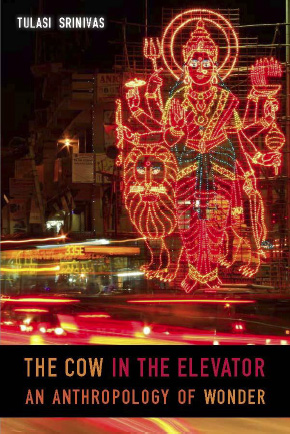
Those wanting lunch must contact Corky White at corky@bu.edu by Monday October 29th at 5 pm
